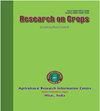非生物胁迫对主要谷物的影响和适应选择——综述
Q3 Agricultural and Biological Sciences
引用次数: 1
摘要
水稻、小麦和玉米等主要大田作物的生产极易受到气候因素和非生物胁迫的影响。在当前气候变化的时代,非生物因素成为限制生长和产量的因素。在非生物因素中,温度、土壤湿度、盐度、二氧化碳水平升高和太阳辐射是影响主要谷物生产力的主要因素。为了应对这种情况,有必要了解非生物因素对作物的不利影响,特别是主要谷物。然而,适应药剂对于确保主要谷物的农业可持续性要重要得多。查阅的现有文献提出了一些主要谷物的适应选择,以对抗非生物胁迫的不良影响,包括改变品种和作物、控制播种或移植时间、采取适当的营养和水分管理、节水措施、采用适当的作物建植方法和适当的种植制度。此外,这篇综述文章提出了一些建议和未来展望,强调了考虑到气候变化的不利影响,未来对具有气候适应性的食品生产进行进一步研究的范围。本文章由计算机程序翻译,如有差异,请以英文原文为准。
Abiotic stresses impact on major cereals and adaptation options - A review
The production of major field crops, namely, rice, wheat, and maize, is highly vulnerable to climatic factors and abiotic stresses. In the present era of climate change, abiotic factors emerged as limiting concerns for flourishing the growth and yield. Among the abiotic factors, temperature, soil moisture, salinity, elevated carbon dioxide levels and solar radiation are the prime concerns for affecting the productivity of major cereals. To combat with the situation, it is necessary to understand the adverse impacts of the abiotic factors on crops with special reference to major cereals. However, adaptation potions are much more important to ensure the agricultural sustainability of major cereals. The available literature reviewed suggested some adaptation options for major cereals to combat the ill effects of abiotic stresses which include the change in variety and crop, manipulation in sowing or transplanting time, adoption of proper nutrient and water management, water conservation measures, adoption of the appropriate crop establishment methods and suitable cropping system. Further, the review article has made some recommendations and future perspectives highlighting the scope of further research for a climate-resilient production of foods for the future considering the adverse effects of the climate change.
求助全文
通过发布文献求助,成功后即可免费获取论文全文。
去求助
来源期刊

Research on Crops
Agricultural and Biological Sciences-Soil Science
CiteScore
1.50
自引率
0.00%
发文量
93
审稿时长
1 months
期刊介绍:
The Research on Crops is a peer-reviewed journal publishing original research papers, review articles and short communications in English on all basic and applied aspects of crop sciences, agricultural water management, agro-climatology, agroforestry, agronomy, crop production, crop protection, cropping systems, food science & technology, genetics & plant breeding, horticulture, plant & soil science, plant biotechnology, plant nutrition, post-harvest management of crops, seed science, soil management & tillage, vegetables, weed science, agricultural engineering, agri-business, agricultural economics and extension, etc. The aim of the journal is to provide a forum for the scientific community to publish their latest research findings.
The manuscripts submitted for publication should not contain data older than 4 years on the date of submission.
The articles submitted for publication in this journal should not be submitted elsewhere simultaneously for publication in another journal. These should not carry any copyright material without prior permission of copyright holder.
The articles should present a complete picture of the investigation made and should not be split into parts.
There is no prescribed limit regarding the number of pages in case of full-length articles. However, the authors are advised to keep the length of their articles from 4 to 10 full printed pages of the journal.
The articles should be divided into the sub-sections: ABSTRACT, INTRODUCTION, MATERIALS AND METHODS, RESULTS AND DISCUSSION, CONCLUSIONS, and REFERENCES. Tables and figures should be appended separately at the end.
 求助内容:
求助内容: 应助结果提醒方式:
应助结果提醒方式:


